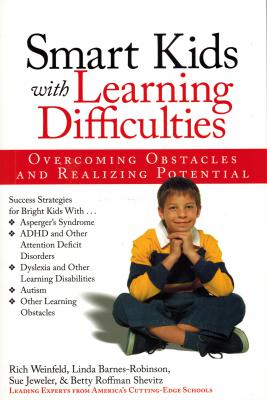Summary
Smart Kids With Learning Difficulties: Overcoming Obstacles and Realizing Potential is an engaging must-read for any parent, educator, or counselor of smart kids who face learning difficulties. The authors, who have more than 20 years experience working with and advocating for gifted and learning-disabled children, provide useful, practical advice for helping smart kids with learning challenges succeed in school.
The purpose of Smart Kids With Learning Difficulties is to guide parents and educators toward identifying and planning for smart kids with learning challenges so that they will reach their true potential. This book deals with research and experience the authors have gained from working directly with students who are smart, but struggle in school. The authors present learning and teaching methods that have been applied successfully to both the gifted and talented and the learning-disabled populations. These methods can, and should, be used with all bright kids with learning difficulties, whether or not they have official labels.
Topics covered in the book include identifying and recognizing gifted/learning-disabled students, what the law says about this population, planning and developing accommodations that empower these students, what works and doesn't work in the classroom, tools and checklists to build supportive learning environments, and the roles and responsibilities of parents, students, and school personnel.
Reviews
Teachers and parents will find the guide's many suggestions useful in identifying the appropriate interventions and obtaining appropriate services that will lead to success for these special students. The authors have created a practical manual in how to navigate the waters for these twice-exceptional students.
-Susan Baum, Ph.D., Professor of Gifted Education, The College of New Rochelle
The authors have provided the field of gifted education with an important practical compendium of information on the basis of addressing the needs of such students: who they are, how we find them, what we do for them, and who is responsible. Teachers should read it as a primer for salvaging the lives of several of the children in their charge.
-Joyce VanTassel-Baska, Ed.D., Executive Director, Center for the Gifted Education, College of William and Mary


